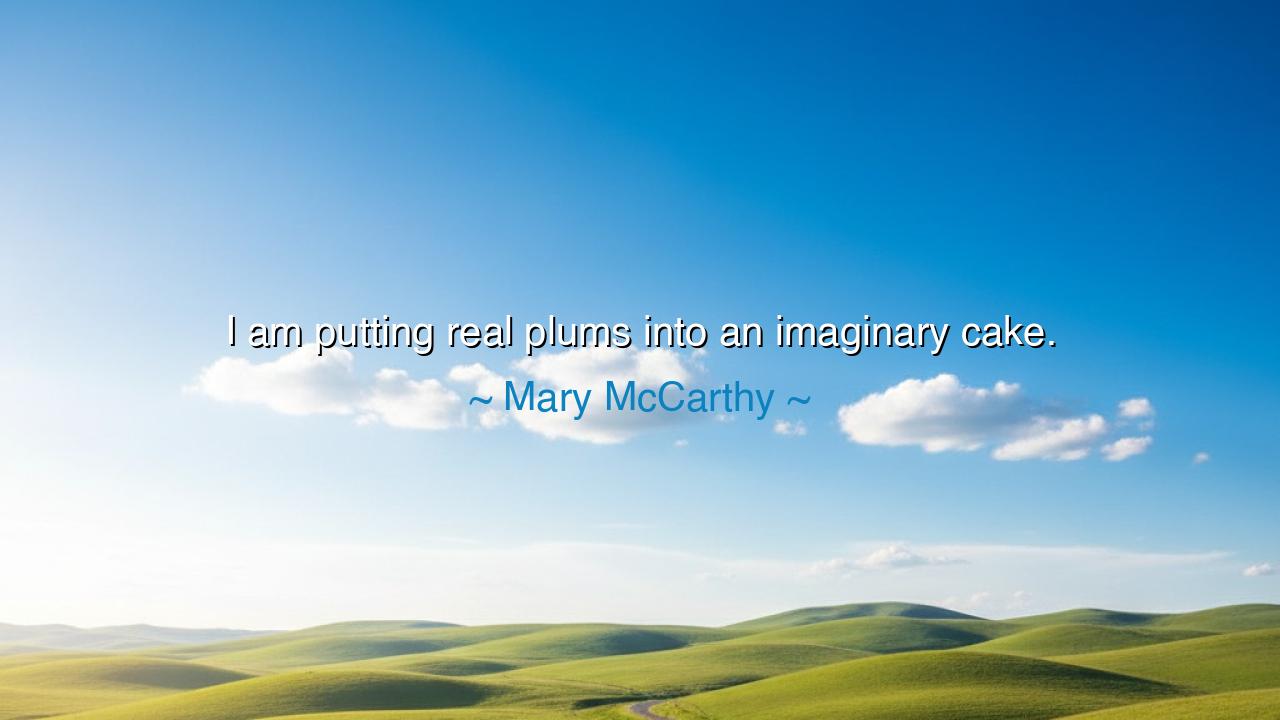
I am putting real plums into an imaginary cake.






The writer Mary McCarthy, with a voice both playful and profound, once said: “I am putting real plums into an imaginary cake.” Though her words may seem light and whimsical, they conceal a deep truth about the act of creation, about how the real and the imagined intertwine in the making of art, thought, and life itself. McCarthy, who lived among the poets and philosophers of her age, understood that the artist’s task is to draw nourishment from the tangible world—the sweetness of the plums—and offer it to a vision that exists only in the mind. Thus, she reveals the paradox of the creator: to make what is unreal feel real, and to transform life into imagination, and imagination back into life.
To put real plums into an imaginary cake is to gather the raw material of human experience—pain, joy, memory, truth—and weave it into something that cannot be touched, but can be felt more deeply than anything physical. The plums are the details of existence, the fragrant fruits of reality. The cake is the vision, the dream, the story that lives only in the world of spirit. The artist, like the alchemist of old, combines the two: taking the weight of the world and turning it into meaning. McCarthy’s words, therefore, are a declaration of faith in the power of imagination—that the invisible can hold more substance than the visible, and that the imaginary, when nourished by truth, becomes a form of immortality.
Consider the life of Vincent van Gogh, the mad genius of color and light. His world was filled with poverty, loneliness, and pain—yet he did not paint what he saw, but what he felt. The fields, the stars, the faces he painted were real plums, taken from his own life, but he placed them into the imaginary cake of his art. Each stroke of his brush transformed sorrow into radiance, isolation into beauty. The sunflowers he painted never existed exactly as he saw them, yet they live more vividly in his canvas than in any garden on earth. Through him, McCarthy’s truth comes alive: the imaginary, when born from honest experience, becomes more real than reality itself.
For creation is not imitation—it is transfiguration. To create is to take the essence of life and give it another form. The poet writes of heartbreak not to describe it, but to transform it into song; the philosopher uses reason to sculpt meaning from confusion; the teacher, the parent, the dreamer—all of them, in their own ways, put real plums into imaginary cakes. We live twice, as Goethe once said—once in reality, and once in imagination. The first nourishes the second, and the second redeems the first. Without imagination, life is mere existence; without reality, imagination is an empty shadow. Only together do they form the fullness of being.
But McCarthy’s words also speak beyond art—they speak to the way we all must live. Every hope, every plan, every vision of who we might become begins as an imaginary cake. We take the real plums of effort, discipline, and love, and we place them into dreams that do not yet exist. The builder who envisions a cathedral where there is only stone, the scientist who dreams of flight while staring at a bird, the child who plays pretend and becomes one day what she imagined—all of them live McCarthy’s wisdom. To dream is divine, but to fill that dream with the sweetness of reality—that is mastery.
And yet, the work is never easy. The imaginary cake will never be fully baked; it will always hover between vision and failure, between what is and what could be. But this, too, is the beauty of creation: its incompleteness mirrors the human soul. We are all, in a sense, bakers of invisible feasts—feeding others with the fruit of our truth, even when the cake cannot be seen. Those who dare to imagine without substance fall into illusion; those who live only in substance forget to dream. The balance is the art.
So, my listener, remember this teaching: bring the real into the imaginary. Do not flee from the world, but let it season your dreams. Let your experiences—your failures, your loves, your pains—become the ingredients of something larger, something unseen. Whether you write, build, teach, or simply live with intention, you too can place real plums into imaginary cakes—acts of creation that nourish the soul and endure beyond your years.
For in the end, it is not the cake we remember, but the sweetness it leaves behind.






AAdministratorAdministrator
Welcome, honored guests. Please leave a comment, we will respond soon